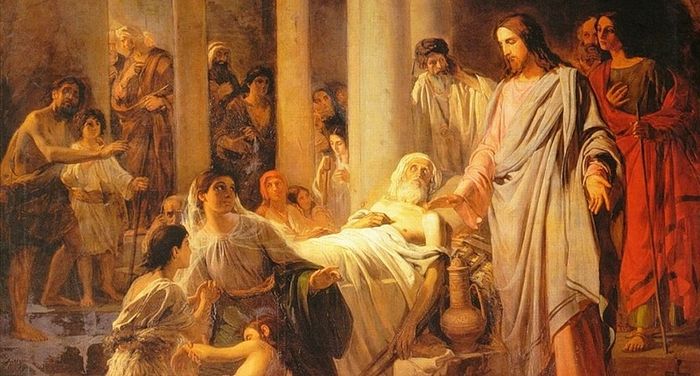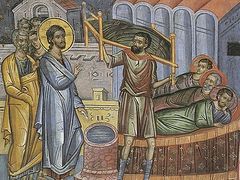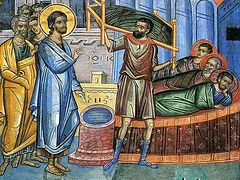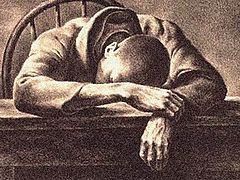The author, Fr. Alexander Shargunov, is currently in critical condition in the ICU due to COVID-19. We ask our readers to pray for him!
John 5:1–15
After this there was a feast of the Jews; and Jesus went up to Jerusalem. Now there is at Jerusalem by the sheep market a pool, which is called in the Hebrew tongue Bethesda, having five porches. In these lay a great multitude of impotent folk, of blind, halt, withered, waiting for the moving of the water. For an angel went down at a certain season into the pool, and troubled the water: whosoever then first after the troubling of the water stepped in was made whole of whatsoever disease he had. And a certain man was there, which had an infirmity thirty and eight years. When Jesus saw him lie, and knew that he had been now a long time in that case, he saith unto him, Wilt thou be made whole? The impotent man answered him, Sir, I have no man, when the water is troubled, to put me into the pool: but while I am coming, another steppeth down before me. Jesus saith unto him, Rise, take up thy bed, and walk. And immediately the man was made whole, and took up his bed, and walked: and on the same day was the sabbath. The Jews therefore said unto him that was cured, It is the sabbath day: it is not lawful for thee to carry thy bed. He answered them, He that made me whole, the same said unto me, Take up thy bed, and walk. Then asked they him, What man is that which said unto thee, Take up thy bed, and walk? And he that was healed wist not who it was: for Jesus had conveyed himself away, a multitude being in that place. Afterward Jesus findeth him in the temple, and said unto him, Behold, thou art made whole: sin no more, lest a worse thing come unto thee. The man departed, and told the Jews that it was Jesus, which had made him whole.
Today’s Gospel is about the healing of the paralytic—a man who was sick for thirty-eight years. We are shown how great is the Lord’s power of love, which truly conquers every evil, every sin, and gives joy where there is hopeless sorrow. God’s word directs our attention to the time when the healing took place. This was a feast of the Jews, that is, the Old Testament Passover. Christ comes to Jerusalem for the feast. God’s feast is a great gift of divine goodness. A multitude of people from all corners of the country and converts from other countries gathered for the feast in order to glorify God. When people are inwardly disposed to a striving for God, God opens their minds to divine light and mercy.
This was in the Sheep’s Pool, in Bethesda, which means, “house of mercy”. For here God’s mercy was manifested to the sick and despairing people. Isn’t this why God’s churches exist in the world? What would happen to the world, in which there is so much misfortune, if these houses of mercy did not exist?!
What is the Sheep’s Pool? The holy Church reminds us that it was near the Sheep’s gate in the Jerusalem temple, through which the sheep, the lambs, were brought for sacrifice. They would first be washed in this pool; and this was a prefiguration of the coming Great Pastor, Who would offer Himself as a sacrifice for rational sheep. There were five porches in it—a reminder of His five wounds, by which He grants us healing. The Angel of the Lord would come down from time to time from the heavens and trouble the waters as a herald of the Savior’s descent to us. The bubbling of the waters from the heavenly touch is a prefiguration of the great sanctification of the baptismal waters. And every time this sanctification takes place in the churches, the priest touches the cross to the water with a prayer, setting it in motion, and becomes healing water.
We hear that the first to enter these waters would receive healing, no matter what his disease. That is, the first to enter the waters, and not the one who took his time and came late. Every now and then the Lord gives us the opportunity to have contact with a miracle that will never be repeated.
Whom does Christ choose for healing? The one who was sick for so long, and whose sickness was particularly onerous. There were many sick people in Bethesda, but the Lord’s gaze rested upon one of them—the most helpless. How many times did but one step separate him from the healing waters, but each time someone else went in before him. It is impossible for anyone to overcome this principle of life, or rather, death, of “each man for himself”. Only Christ brings the victory over sin and death, and establishes the principle of new, incorruptible life. And he teaches it to everyone who believes in Him.
Let us imagine what a podvig this sick man bore. We cannot but be stunned by his great and holy patience, with which he bore his illness. Thirty-eight years—that is a relative time. We know that time is relative. Whether time passes quickly or slowly depends on a man’s state. When someone has joy, or grace, time flies as if on wings. It flies quickly, as if it doesn’t exist at all. When a person has woes or illnesses, time is not only wingless; it seems to be legless and crawling, as if it doesn’t budge from one spot. Time doesn’t move, and it’s hell on earth. And that is how it was for thirty-eight years, hour after hour. How would it be for us if we were seriously ill for thirty-eight days?! But this was thirty-eight years, day after day, year after year.
We are talking about this for a reason, because in our fainthearted days, some are even ready to commit suicide when something like this happens to them. How much information have we seen in the news: Officers shooting themselves, mothers committing themselves and their children to a desperate death, teenagers taking their own lives, even in groups. The courage to withstand any trial, any suffering, is obtained through Christ’s cross, through closeness to the Lord, His gift and His grace.
The paralytic man continued year after year to lie by the waters, hoping that sooner or later help would come to him. And it is revealed to us that the first is not the one who comes first to the shrine, pushing others aside, but the one who confesses himself to be the first of sinners, and for this reason considers his situation to be the most hopeless. Christ God comes to him first. Wilt thou be made whole? the Lord asks every person. And there is probably not a single man who would waiver in his answer. Sir, I have no man, when the water is troubled, to put me into the pool, the sick man replies to Jesus, but while I am coming, another steppeth down before me.
No man. The blind man has a guide, the lame man has a relative, another paralytic has friends, but this man has no one in the world who could help him, although there are thousands of people around—you could say, all mankind. On the other side is the Jerusalem temple, where the priests talk endlessly about how we much perform deeds of mercy. And all hear these sermons, and then leaving the temple, pass right by the paralyzed man. And there isn’t a single person. He has no man, the synaxarion says to us today, and therefore the word of God, the Pre-Eternal God became Man, in order to come to this sick person lying by the Sheep’s Pool to save him.
Arise, take up thy bed and walk, says Christ to the paralytic. Here we see how the Jews react to this miracle—those to whom the people’s spiritual and moral enlightenment was entrusted. They say to the healed man: It is the sabbath day: it is not lawful for thee to carry thy bed... What man is that which said unto thee, Take up thy bed, and walk? They wanted to know just who this man was who defiled the Sabbath. But they wanted to know not in order to be amazed along with the healed man about this miracle, and not in order to gather the whole city, all the people, and say, “Look, what Christ can do!” but in order find out Who worked this miraculous healing and then kill Him.
Why do they want to kill Christ? Because He was the only one out of all who saw the paralytic and came to help him. He was the only Man Who intentionally sailed across the Sea of Galilee and came to the lake of Gennesaret in order to meet the two demon-possessed men and heal them. And it was no accident that He came to the gates of the city of Nain in order to meet the funeral procession, where the mother was disconsolately weeping over her only son.
In was not by accident that this only Man came to the Sheep’s Pool. He came because for Him, every person is the one and only. And he wants for each of us to become the one and only, for whose sake He became incarnate and to whom He goes—and for whom He will be killed by these false righteous ones, false keepers of the truth, who create an idol from divine mysteries, from their own false piety.
Don’t we also have such “piety” today? Aren’t there such people among us who think that the suffering of the world around us has nothing to do with them personally, as long as they observe everything: all the fasts and church institutions (keep the “Sabbath”)? That is, they fulfill everything necessary, but they don’t see a person, they don’t see the people who, like that paralytic, lie not thirty-eight years, nor seventy years, and have no healing.
The Merciful Lord, seeing the wrath of the scribes and Pharisees, the teachers of the Israelites, passes freely amongst them because His time has not yet come. But the time will come when for the sake of the salvation of all people he will give Himself into the hands of these lawless ones, into the hands of sinful people, so that by His unfathomable humility, His love for every person, He would conquer the evil reigning in the world, trampling down death by death; and reveal to us the mystery of our participation in His Resurrection.
Who is this Man? the Jews angrily ask. The healed man was in no condition to give them an answer. He knew that the most authentic goodness there can be the world had touched him, but he did not have a clear idea of the Healer. He did not know anything about Christ when he accepted His gift. Christ performs many acts of mercy also for those who do not know Him. He illumines, strengthens, and consoles us, delivers us from a thousand disasters, and we do not know who He is. And the Lord departs from us, as he departed for a time from the healed paralytic.
Where does that man again find Christ? Christ went to the temple, and the man who was healed went to the temple. He went to the temple because he had not been there for a long time due to his illness. Perhaps he had not been to the temple for those thirty-eight years. This is a sign of a truly profound soul. The first place he goes is the temple, to God. And he meets there the Living God—Christ. Behold, thou art made whole, Jesus says to him, sin no more, lest a worse thing come unto thee. The Lord shows the reason why he was sick for such a long time. It is our nature, when we are in trouble, in sickness, when grace has abandoned us, to promise much, to humble our souls with prayer and fasting. And when we receive mercy from God, we try for a time to live according to Christ’s word, but then gradually forget about everything. The Lord warns us about this danger: “Lest a worse thing come to you”, because beside divine mercy there is also divine justice. If you reject God’s mercy, if you do not want to build your relationship with God upon such conditions—there is divine justice. And this warning is not only for the Gospel paralytic but to each of us—when the Lord again and again receives us in repentance, and again and again repeats these words. His mercy as if again conquers; but who of us knows where the limits will be, when it is suddenly revealed in the final justice of the Last Judgment, or in what will happen before the Last Judgment here on earth to us.
We have received more than anyone—deliverance: on the Pascha of the Lord we have tasted eternal life. And we know by what high price this was given to us: For the healing of the paralytic, for all the good he did for people, the Jews sentenced our Lord to death as the destroyer of the Sabbath. But His death reveals an infinitely greater miracle to the human race—the Resurrection from the dead.




